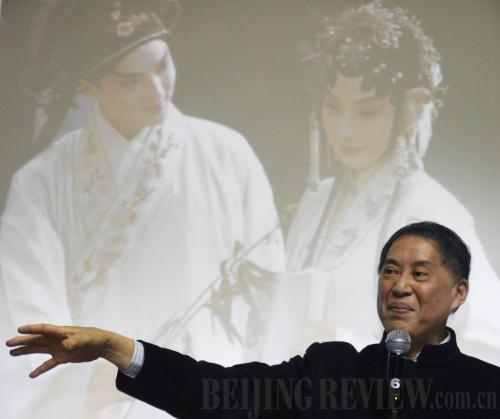|
 |
|
TELLING A LOVE STORY: Pai Hsien-yung lectures to a crowd of college students on the aesthetics of Kunqu, citing the example The Peony Pavilion (WEI YAO) | Pai's passion for Kunqu was rekindled in 1987 when he returned to the mainland for the first time as a guest professor at Shanghai Fudan University. There he was overwhelmed by the wonderful performance of Cai Zhengren and Hua Wenyi, leading artists of the Shanghai Kunqu Opera Co.
This inspired him to produce a two-and-a-half-hour version of The Peony Pavilion featuring Hua in Taipei in 1992, but that was still far from realizing his dream of staging a complete Kunqu production.
Comparing the mainland to Taiwan, Pai said the latter has a solid audience base for Kunqu but less well-trained performers, while the mainland had the best performers but a shrinking audience and low performers' incomes.
Thanks to decades of promotion in Taiwan's colleges, Kunqu enjoyed a much younger audience than Peking Opera in Taiwan, said Pai. Young Kunqu fans have been told not only to catch every line of the opera but also to understand the subtle meanings of each move and the singing.
Based on Taiwan's successes and his multi-cultural background, Pai realized there were two directions for promoting Kunqu: It must win a large audience on campuses and establish connection with an overseas audience.
Pai wanted modernized, "more beautiful" productions catering to young audiences and with universal themes. In 2002, he discovered two candidates, Yu Jiulin and Shen Fengying, perfect for the leading male and female roles in The Peony Pavilion and invited two Kunqu maestros Wang Shiyu and Zhang Jiqing to train them to perform in his adapted version for youth. Different from the original text that contains other subplots, Pai's adaptation focuses on the love story between Du Liniang and Liu Mengmei, the main characters in The Peony Pavilion.
Since its premiere in 2004, the nine-hour, three-night show has been performed 184 times on the mainland, in Taiwan, the United States, Britain and Greece to great acclaim. This was carried out with sponsorship from the Hong Kong-based Robert H.N. Ho Family Foundation and others of 30 million yuan ($4.4 million).
Its success came from a perfect blending of tradition with innovation. "The biggest challenge is how to combine tradition and modern aesthetics, how to revive the 600-year-old art on the 21st-century stage," Pai said. "We use modern lighting, costumes and settings but the acting, narrative and singing retain a traditional style."
Applying this belief, Pai staged The Jade Hairpin, another adapted version of a Kunqu production for youth, also performed by Yu and Shen, at Peking University last December.
"I feel happy for the young audience at Peking University who have fallen into love with Kunqu, because I have been worried that they, not long familiar with China's classic works, would not be as steadfast as I am in loving them," Pai said. "It's my greatest reward to see China's classics still glittering on the modern stage and moving these young people."
Cultural identity recognition
With the launch of the five-year Kunqu Inheritance Plan, Pai aspires to a bigger goal.
"I expect a new round of cultural revival as young Chinese pick up courses on China's traditional culture and revalue cultural traditions, because I think college students today are all looking for a cultural identity," he said at the launching ceremony of the program on March 11.
The plan will include the optional course at Peking University, performances, exhibitions and lectures, a digital corpus for Kunqu repertoire and a special fund for Kunqu Inheritance.
Pai insisted on cultivating future audiences for Kunqu in universities. Except for 39 shows overseas, a majority of 184 shows of The Peony Pavilion were given in universities on the mainland. Half of the tickets for performances at universities were priced relatively inexpensively, at "several dozen yuan ($4-8)."
Thanks to nationwide campus promotion, the show has earned a loyal following. Nearly 100 students from universities in Beijing attended the March 18 audition to stage the campus version of The Peony Pavilion.
Jin Gu, a postgraduate student who majors in Digital Arts at Peking University surprised the panel with his performance. Jin said he became interested in Kunqu five years ago and came along for the chance to be instructed by Kunqu maestro Zhang Jiqing, one of the judges.
"Kunqu is a comprehensive art form, a combination of traditions and performance. The most difficult part of it is the text and the accents," Jin said. "You have to remember all these lines before practice."
Pai has many hopes: that more universities will offer Kunqu courses; that experts and scholars cooperate with Kunqu troupes to produce quality shows; to have a theater devoted to Kunqu performances beside beautiful gardens in Suzhou.
But he knows that he can not accomplish this by himself and the success of one show does not equate to a revival of Kunqu. | 